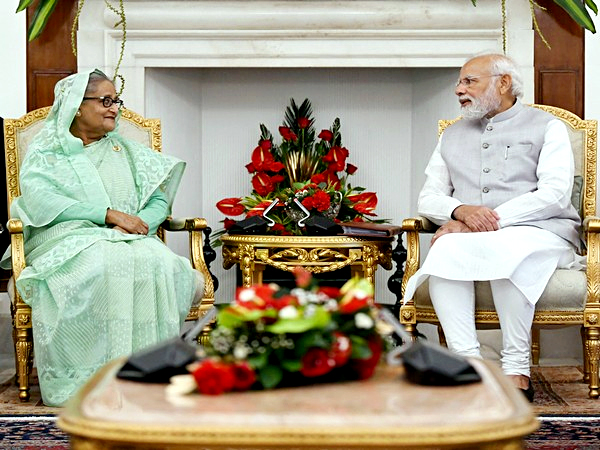Bangladesh’s vision aligns with India’s vision of a free and rules-based Indo-Pacific.
Amritsar
India has long parted from the centrality of Pakistan in its foreign policy and as the assertiveness of China started growing into the waters of the Indian Ocean in the last decade, India looked from the west to the eastern shore of the Bay of Bengal. With a rapidly growing economy backed by a stable government and the other countries of South Asia having a larger dependency on China, Bangladesh became an important element in India’s neighbourhood policy.
With a shared history and culture, the ties between India and Bangladesh were natural and there has been significant progress made in multiple areas including bilateral trade which has only increased with Indian investments. Bangladesh is one of the largest recipients in terms of the Line of Creditfunds from India and India’s exports to Bangladesh in 2022 amounted to US$13.83 billion, while the imports stood at US$2 billion. The hallmark of the present-day relations however is the energy sector cooperation, connectivity, and engagement in areas of science and technology. Bangladesh currently imports 1,160 megawatts of power from India and the 2017 agreement with Adani Power Ltd will provide 1,496 MW of electricity from a coal-based power plant in Jharkhand for 25 years. Bangladesh has also shown interest in procuring military equipment from India including the Tejas light combat aircraft and Dhruv light helicopters apart from protective gear like bulletproof jackets and helmets.
DHAKA’S INDO-PACIFIC OUTLOOK
Historically, Dhaka’s foreign policy has been based on a collaborative approach to avoid being dragged into any geopolitical tensions where there aren’t any vested interests. Although it cannot fully embody the strategic interest of Bangladesh, the idea of“friendship for all and malice to none” became a guiding principle of Bangladesh’s foreign policy. The Indo-Pacific Outlook (IPO) document unveiled by the Foreign Minister Dr A.K. Abdul Momen on 24 April followed a similar pattern and called fora “free, open, peaceful, secure and inclusive Indo-Pacific”, which was linked to its “Vision 2041” of being a knowledge-based developed country.
The IPO of Bangladesh aligns with India’s vision which has also been in support of a free and rules-based Indo-Pacific and though the document claims to be neutral, it has a Western slant. The West has been trying to include Bangladesh in their Indo-Pacific strategy and bring it closer through key trade and investment partners. Bangladesh’s strategic location serving as a gateway to both South and Southeast Asia and having friendly relations with the Quadrilateral Security Dialogue members makes it an ideal partner for the West and India to engage in their Indo-Pacific vision. India’s interest in maintaining security and access to the volatile northeasternpart of the country and having direct access to the Bay of Bengal can only be possible by engaging Bangladesh. This is in addition to the interest of further strengthening the “Act East Policy” and containing the military rise of China in the region. New Delhi is aware of this and has been actively engaging Bangladesh through the Bay of Bengal Initiative for Multi-Sectoral Technical and Economic Cooperation (BIMSTEC) after the shift from South Asian Association for Regional Cooperation (SAARC) for regional outreach.
INDIA’S G20 PRESIDENCY AND BANGLADESH
As India holds the presidency for the G-20 summit this year, it has followed the tradition and invited other non-member countries including the only South Asian country, Bangladesh to the summit. This speaks volumes of the importance that India has attached to its eastern neighbour and the role of Bangladesh in its Indo-Pacific vision. India will be looking to cooperate with Bangladesh in the area of climate change, especially after the visit of Prime Minister Sheikh Hasina to Delhi last year and also collaborate in a smoother transition to cleaner sources of energy. Apart from this, India and Bangladesh will look to sign the Comprehensive Economic Partnership Agreement (CEPA) that will further boost connectivity and future trade through Asian Network routes (AH-1 and 2), and BIMSTEC. Since the dominance of the US dollar has been in decline, India and Bangladesh have decided to cut their dependency on the US dollar for transactions and have their trade settlement in rupee. Lastly, the CEPA will also open up opportunities to create a joint production hub and uninterrupted supply chain.
The regional connectivity however needs to be translated into business avenues that can foster growth. With the two governments sharing good relations and Bangladesh’s willingness to be a part of India’s Indo-Pacific relationship, New Delhi has to go the extra mile to offer incentives in terms of Indian investments to Dhaka to steer its own Indo-Pacific vision.
Ratnadeep Chakraborty is the Co-founder of an independent media company that covers the spheres of strategic affairs called, The Honest Critique. Ekampreet Kaur has worked as a Junior Project Officer for the International Telecommunications Union (ITU) and hosted shows on strategic affairs for The Honest Critique.

